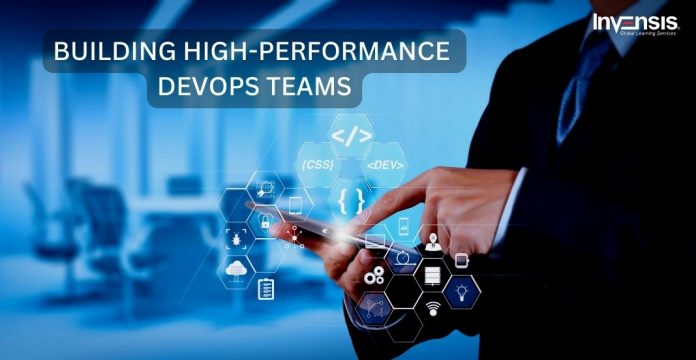
DevOps is a software development methodology that combines the roles of development and operations teams to improve the speed and efficiency of software delivery. As organizations increasingly adopt DevOps practices, building a high-performing team has become a critical aspect of modern software development. This blog post will provide tips and strategies for building a high-performing DevOps team, including defining clear roles and responsibilities, fostering a culture of collaboration, implementing automation, monitoring performance, and continuously improving processes. By following these guidelines, organizations can improve their software development and delivery processes and achieve faster and more efficient software delivery.
Importance of Building a High-Performing DevOps Team
Building a high-performing DevOps team is important for organizations that aim to deliver software quickly and efficiently. A high-performing DevOps team can help to:
- Reduce deployment time: By implementing automation, continuous integration, and continuous deployment (CI/CD) practices, a high-performing DevOps team can reduce the time required to deploy new software.
- Increase the frequency of releases: With a high-performing DevOps team, organizations can release new software more frequently, which can help to stay ahead of the competition.
- Improve overall quality of the software: A high-performing DevOps team can improve the overall quality of the software by implementing automation and regular testing, which can help to catch and fix bugs more quickly
- Improve efficiency: With automation and collaboration, a high-performing DevOps team can work more efficiently and avoid delays and confusion
- Monitor and measure performance: With a high-performing DevOps team, organizations can monitor and measure key performance indicators (KPIs) to track progress and identify areas for improvement
- Encourage learning and experimentation: A high-performing DevOps team should always strive to improve; by encouraging learning and experimentation, teams can become more efficient and deliver better results
- Emphasize the culture of trust and ownership: A high-performing DevOps team is one where team members trust and respect each other and take ownership of their work. By fostering a culture of trust and ownership, teams can work more efficiently and deliver better software
Building a high-performing DevOps team is crucial for organizations that want to stay competitive and deliver software quickly and efficiently.
Tips to Build a High-Performing DevOps Team
Building a high-performing DevOps team is crucial for organizations looking to improve their software development and delivery processes. Organizations can achieve faster and more efficient software delivery by aligning development and operations teams. Here are some tips for building a high-performing DevOps team:
Define Clear Roles and Responsibilities
One of the key steps in building a high-performing DevOps team is to define clear roles and responsibilities for each team member. This includes identifying who will be responsible for development, testing, deployment, and operations. By defining these roles, team members will better understand their responsibilities and be better equipped to work together toward a common goal.
Foster a Culture of Collaboration
DevOps teams are built around collaboration, and organizations should ensure that their teams work together effectively. This can be achieved by fostering a culture of collaboration, where team members are encouraged to share ideas and work together to solve problems. By fostering a culture of collaboration, teams will be better equipped to identify and resolve issues quickly, leading to faster software delivery.
Implement Automation
DevOps teams are focused on automating processes, and organizations should invest in tools and technologies to help automate processes. Automation can streamline workflows, reduce errors, and improve software delivery speed. Additionally, automation can help teams work more efficiently and effectively, leading to improved performance.
Encourage Learning and Experimentation
DevOps is an ever-evolving field, and teams should be encouraged to learn new tools and techniques. Regular training sessions and hackathons can be organized to encourage learning and experimentation. Additionally, teams should be encouraged to test new tools and techniques in a safe, sandboxed environment.
Emphasize the Culture of Trust and Ownership
A high-performing DevOps team is one where team members trust and respect each other and take ownership of their work. By fostering a culture of trust and ownership, teams can work more efficiently and deliver better software.
Monitor Performance
Monitoring performance is critical for any high-performing DevOps team. Therefore, organizations should invest in monitoring tools and technologies that will help them measure and track performance. This includes monitoring the performance of individual team members as well as the overall performance of the team. By monitoring performance, organizations can quickly identify and resolve issues, leading to improved performance.
Incorporate Continuous Integration and Continuous Deployment (CI/CD)
CI/CD is a practice that allows teams to quickly and easily push code changes to production. By automating the build, test, and deployment process, teams can ensure that code changes are deployed quickly and without errors. Tools such as GitLab, Jenkins, and Travis CI, can be used to implement CI/CD.
Continuous Improvement
Finally, a high-performing DevOps team is always looking for ways to improve. By continuously reviewing and refining processes, teams can identify opportunities for improvement and make changes that will lead to better performance. Organizations should encourage their teams to think critically and to always be on the lookout for ways to improve.
In summary, building a high-performing DevOps team requires a combination of clear roles and responsibilities, a culture of collaboration, automation, monitoring performance, and continuous improvement. By following these tips, organizations can improve their software development and delivery processes and ultimately achieve faster and more efficient software delivery.
Conclusion
In conclusion, building a high-performing DevOps team is crucial for the success of any organization that aims to deliver software quickly and efficiently. By following the steps mentioned above, organizations can create a culture of collaboration and trust that will allow them to deliver software quickly and efficiently. It’s important to remember that building a high-performing DevOps team requires ongoing effort and attention, so it’s important to review processes regularly and make adjustments as needed.
Looking to fast-track your DevOps career? Then earning the right DevOps certification can help you build expertise, gain recognition, and advance your career. A DevOps certification could enhance your resume, boost your salary potential, validate your expertise in development cycles, and set you up for more advanced career opportunities. In addition, DevOps positions are consistently ranked among the highest paying in the technical field. So enroll now with Invensis Learning DevOps Certification Courses and start your DevOps career today!
Glossary
- DevOps: A culture and set of practices that bring development and operations teams together to collaborate and automate the software delivery process
- Roles and Responsibilities: Clearly defined roles and responsibilities for each team member within the DevOps process
- Collaboration and Communication: Encourage teams to work together and create a culture of open communication and trust
- Automation: Automating repetitive tasks to reduce errors, speed up the software delivery process, and improve overall efficiency
- Continuous Integration and Continuous Deployment (CI/CD): Practice that allows teams to quickly and easily push code changes to production by automating the build, test, and deployment process
- Monitoring and Measuring Performance: Tracking key performance indicators (KPIs) such as deployment frequency, lead time, and mean time to recovery (MTTR) to monitor and measure performance
- Learning and Experimentation: Encourage teams to learn new tools and techniques, and test them in a safe, sandboxed environment
- Culture of trust and ownership: Fostering a culture of trust and ownership where team members take responsibility for their work, trust and respect each other
- Continuous improvement: Continuously review processes and identify areas for improvement to become more efficient and deliver better software
————————————————————————————————————————————-Organize Corporate Group Six Sigma Certification training for your teams around the world.
Invensis learning provides In-person and live virtual instructor-led corporate training program customized for enterprise teams who wish to train their employees on specific aspects of their job processes or responsibilities. The corporate training by our expert certified trainers will enhance your learning curve and enable your teams to utilize their skills to meet industry standards.
- Experienced & Industry Specific Trainers
- Lifetime LMS access
- Deliver sessions across continents via In-Person/ Virtual Instructor-Led Training
- Customized Training
————————————————————————————————————————————-
















